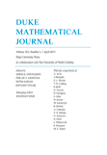
DUKE MATHEMATICAL JOURNAL
Scope & Guideline
Unraveling Complexities, Inspiring Discoveries
Introduction
Aims and Scopes
- Algebraic Geometry and Number Theory:
The journal frequently publishes papers addressing fundamental questions in algebraic geometry, including topics such as Calabi-Yau manifolds, moduli spaces, and intersection theory, often integrating insights from number theory. - Analysis and PDEs:
Research on partial differential equations (PDEs), particularly regarding existence, uniqueness, regularity, and qualitative properties of solutions, is a core focus, with applications to both pure and applied mathematics. - Topology and Geometry:
Papers on various aspects of topology, including homotopy theory, manifold theory, and geometric group theory, are prevalent, reflecting a strong interest in the interplay between topology and other areas of mathematics. - Mathematical Physics:
The journal explores mathematical frameworks that arise in physics, particularly in the context of quantum field theory, statistical mechanics, and integrable systems, highlighting the connections between mathematics and physical theories. - Combinatorics and Graph Theory:
Research related to combinatorial structures, graph theory, and their applications in other mathematical fields is a notable area of interest, showcasing the journal's commitment to interdisciplinary approaches.
Trending and Emerging
- Non-Archimedean Geometry:
There has been a noticeable increase in publications related to non-Archimedean geometry, particularly in relation to algebraic varieties and their applications in number theory, reflecting a growing interest in this area. - Topology and Its Applications:
Emerging research themes in topology, particularly in relation to applications in data science and computational topology, are becoming more prominent, indicating a trend towards interdisciplinary approaches. - Geometry of PDEs:
A rising focus on the geometric aspects of partial differential equations, including mean curvature flow and geometric analysis, highlights an increasing integration of geometric methods in the study of PDEs. - Probabilistic Methods in Mathematics:
The application of probabilistic methods to various mathematical problems, including combinatorial and geometric contexts, is trending upward, reflecting a broader acceptance of these techniques in the mathematical community.
Declining or Waning
- Classical Algebra:
Papers focusing on classical algebraic structures, such as group theory and ring theory, seem to be less frequently published. This may indicate a shift towards more applied or geometric approaches in recent mathematical research. - Elementary Number Theory:
Research in elementary number theory, particularly results that do not leverage modern techniques or deeper structural insights, appears to be declining, suggesting a preference for more complex or abstract approaches to number theory. - Discrete Geometry:
While still relevant, discrete geometry and its applications seem to be waning in frequency, possibly due to an increasing focus on continuous geometrical structures or algebraic aspects.
Similar Journals

Documenta Mathematica
Pioneering Insights in Mathematics Since 1996Documenta Mathematica is a premier academic journal published by the European Mathematical Society (EMS), making significant contributions to the field of mathematics since its inception. With an Open Access model established in 1996, the journal ensures that scholarly works are freely available to a global audience, promoting widespread dissemination of mathematical research. Based in Germany, it serves as a vital platform for mathematicians, covering a wide array of topics within the discipline, evidenced by its impressive Q1 ranking in the miscellaneous category of mathematics as of 2023. Featuring rigorous peer-reviewed articles that span the latest trends and breakthroughs in the discipline, Documenta Mathematica also retains a commendable position among its peers with a Scopus rank of 163 out of 399, placing it in the 59th percentile for general mathematics. Researchers, professionals, and students alike will benefit from the robust scholarly content and the journal's commitment to advancing mathematical knowledge.
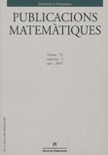
PUBLICACIONS MATEMATIQUES
Cultivating Excellence in Mathematical ScholarshipPUBLICACIONS MATEMATIQUES is a prestigious academic journal published by Universitat Autònoma de Barcelona, specializing in the diverse field of mathematics and its applications. With an esteemed Q1 ranking in Mathematics (miscellaneous) for 2023, this journal holds a significant position in the mathematical community, reflecting a commitment to high-quality research that spans both theoretical and practical aspects of mathematics. Although it operates without an Open Access model, it remains accessible to a global audience, featuring contributions that range from pure mathematical theories to interdisciplinary applications. Based in Spain, its influence and reach extend internationally, making it a vital resource for researchers, professionals, and students alike who seek to stay informed and engaged with cutting-edge developments in mathematics. The journal's continuous publication since 2002 further underscores its role in advancing mathematical research and fostering scholarly dialogue.
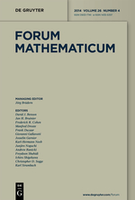
FORUM MATHEMATICUM
Where Mathematics Comes to Life: A Forum for ScholarsFORUM MATHEMATICUM, published by WALTER DE GRUYTER GMBH, is a distinguished academic journal based in Germany, known for its significant contributions to the field of mathematics. With an ISSN of 0933-7741 and an E-ISSN of 1435-5337, the journal features comprehensive studies ranging from applied mathematics to diverse mathematical disciplines. Having maintained a commendable presence since 1989, FORUM MATHEMATICUM has achieved notable classification rankings, including Q2 in Applied Mathematics and Q1 in miscellaneous Mathematics as of 2023. Additionally, it holds a Scopus rank within the top 60th percentile in General Mathematics, making it a prominent platform for researchers and professionals seeking rigorous analysis and innovative methodologies in mathematics. While the journal does not currently offer open access, its rich content is pivotal for advancing mathematical theory and applications, appealing to students and seasoned academics alike.
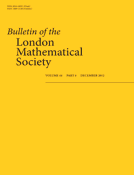
BULLETIN OF THE LONDON MATHEMATICAL SOCIETY
Cultivating Knowledge and Innovation in MathematicsThe BULLETIN OF THE LONDON MATHEMATICAL SOCIETY, published by Wiley, is a distinguished journal that serves as a vital resource in the field of mathematics. With its ISSN 0024-6093 and E-ISSN 1469-2120, this journal has consistently provided a platform for innovative research and scholarly discourse since its inception in 1969. Recognized for its quality, it currently holds an impressive Q1 ranking in the mathematics category, a testament to its significance in disseminating influential findings and trends in the mathematical sciences. Researchers and practitioners can rely on the BULLETIN for its comprehensive coverage of both theoretical and applied mathematics, which caters to a diverse audience ranging from professionals to students alike. Though it does not currently offer Open Access options, its articles can be accessed through institutional subscriptions, ensuring that significant works reach the academic community effectively. With contributions that span over five decades, the journal continues to shape mathematical research and inspire future advancements in the discipline.
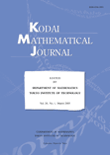
Kodai Mathematical Journal
Bridging Tradition and Novelty in MathematicsKodai Mathematical Journal is a distinguished publication dedicated to advancing the field of mathematics, particularly in miscellaneous areas. Established in 1949, this esteemed journal has been a reputable source for researchers and practitioners who seek to contribute to the rich landscape of mathematical knowledge. Published by KINOKUNIYA CO LTD, the journal is based in the academic environment of Tokyo Institute of Technology and serves a global audience with rigorous and insightful research articles. Despite its current Q3 quartile ranking in the Scopus Mathematics category, which reflects its niche but impactful contributions, the journal is poised for growth; the convergence of traditional and novel mathematical techniques promises to enhance its relevance further. Researchers, professionals, and students are encouraged to engage with the rich content of the journal, aimed at fostering collaboration and nurturing innovation in the mathematical community. While currently not available as Open Access, Kodai Mathematical Journal remains a critical resource for those passionate about mathematics and its applications.

Tunisian Journal of Mathematics
Fostering a Global Community of Mathematical Excellence.Tunisian Journal of Mathematics, an esteemed publication by Mathematical Sciences Publishers, serves as a vital platform for the dissemination of groundbreaking research in the field of mathematics. With an ISSN of 2576-7658 and an E-ISSN of 2576-7666, this journal has quickly established itself since its inception in 2019, evidenced by its impressive Q1 ranking in Mathematics (miscellaneous) for 2023 and Scopus Rank #141 out of 399, positioning it in the 64th percentile among its peers. Dedicated to fostering a vibrant academic community, it invites high-quality contributions that push the boundaries of mathematical theory and practice while advocating open access principles to enhance research visibility and accessibility. Located in Berkeley, California, the journal's editorial board comprises distinguished scholars committed to upholding rigorous peer-review standards, ensuring that only the most relevant and impactful research is published. The Tunisian Journal of Mathematics is not just a journal; it is a cornerstone for researchers, professionals, and students eager to explore the vast and dynamic landscape of mathematics.
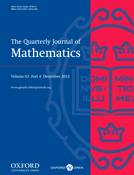
QUARTERLY JOURNAL OF MATHEMATICS
Exploring the Depths of Mathematical InnovationQuarterly Journal of Mathematics, published by Oxford University Press, stands as a pivotal resource for the mathematical community, focusing on a broad spectrum of topics in the field of mathematics. With its esteemed history dating back to 1930, this journal continues to foster innovative research and discussions, providing a platform for scholars to share their findings and insights. Although the journal currently holds a Q3 classification in mathematics (miscellaneous) and is ranked #207 among general mathematics publications in the Scopus database, its commitment to quality and rigorous peer review ensures that it remains relevant and insightful. Researchers, professionals, and students alike will find the Quarterly Journal of Mathematics an invaluable tool for advancing knowledge and understanding in various mathematical disciplines, making it an essential addition to any academic library.

JOURNAL OF THE AMERICAN MATHEMATICAL SOCIETY
Championing the Future of Mathematical ResearchThe Journal of the American Mathematical Society (ISSN: 0894-0347; E-ISSN: 1088-6834), published by the American Mathematical Society, stands as a pillar in the fields of mathematics and applied mathematics. This prestigious journal, with a remarkable impact factor and ranking in the top tier (*Q1*) within both the Applied Mathematics and general Mathematics categories, is recognized for its contribution to advancing mathematical research and theory. With data reflecting it as the 8th ranked journal in General Mathematics (top 2%) and the 34th in Applied Mathematics (top 6%), the journal consistently showcases groundbreaking studies and innovative methods that greatly influence academia and industry alike. Though not an open-access journal, it offers a wealth of resources and intellectual discourse for researchers, professionals, and students alike. Specializing in comprehensive and theoretical aspects of mathematics, the Journal remains dedicated to publishing articles that promote understanding and propel the field forward, highlighting its significance as an essential tool for those engaged in mathematical research.
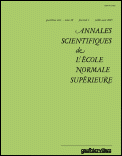
ANNALES SCIENTIFIQUES DE L ECOLE NORMALE SUPERIEURE
Fostering Collaboration in Mathematical ExplorationANNALES SCIENTIFIQUES DE L ECOLE NORMALE SUPERIEURE is a distinguished journal published by the Société Mathématique de France, dedicated to advancing the field of mathematics through high-quality research articles. With a robust impact factor and categorized as Q1 in Mathematics (Miscellaneous) as of 2023, this journal ranks in the top 16% of mathematics publications, showcasing its importance and influence in the discipline. Available in both print (ISSN: 0012-9593) and electronic formats (E-ISSN: 1873-2151), ANNALES SCIENTIFIQUES serves as a central hub for innovative mathematical theories and methodologies, appealing to a diverse audience of researchers, professionals, and students alike. The journal publishes research that spans various domains within mathematics, fostering a collaborative environment for idea exchange. As it converges from 1997 to 2024, it continues to shape the mathematical landscape, providing essential insights and developments within the global academic community. Located in Paris, France, the journal invites contributions that push boundaries and advance the understanding of complex mathematical concepts.
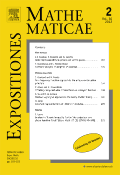
EXPOSITIONES MATHEMATICAE
Advancing Mathematical Frontiers with Rigorous ResearchEXPOSITIONES MATHEMATICAE, published by Elsevier GmbH, stands as a significant journal in the realm of mathematics, catering primarily to researchers, professionals, and students. With an ISSN of 0723-0869 and an E-ISSN of 1878-0792, this journal has made its mark in the academic community, boasting a Q2 classification in the miscellaneous mathematics category for 2023, illustrating its prominence within its field. The journal addresses a diverse scope of mathematical topics, encouraging the publication of original research and innovative theories while maintaining rigorous academic standards. As it converges from 2004 to 2024, EXPOSITIONES MATHEMATICAE continues to be an essential resource for advancing mathematical knowledge and fostering scholarly communication, despite being a non-open-access publication. Its location in Munich, Germany further anchors it within a rich intellectual tradition, providing accessibility for the mathematical community worldwide.